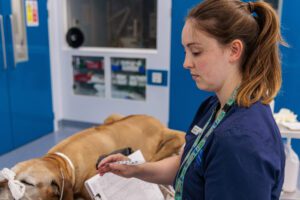Summary
Staphylococcus pseudintermedius is a commensal and opportunistic pathogen of dogs. It is mainly implicated in canine pyoderma, as well as other suppurative conditions of dogs. Although bacterial culture is routinely used for clinical diagnosis, molecular methods are required to accurately identify and differentiate S. pseudintermedius from other members of the Staphylococcus intermedius group. These methods, owing largely to their cost, are not easy to implement in nonspecialized laboratories or veterinary practices. In the current study, loop-mediated isothermal amplification (LAMP), a novel isothermal nucleic acid amplification procedure, was employed to develop a rapid, specific, and sensitive S. pseudintermedius assay. Different detection strategies, including the use of a lateral flow device, were evaluated. The assay was evaluated for cross-reactivity against 30 different bacterial species and validated on a panel of 108 S. pseudintermedius isolates, originating from different dog breeds and locations within the United Kingdom. The assay was specific, showing no cross-reactivity during in silico and in vitro testing. When tested using DNA extracts prepared directly from 35 clinical surgical site swabs, the assay could detect S. pseudintermedius in less than 15 min, with a diagnostic sensitivity of 94.6%, superior to that of a polymerase chain reaction method. The LAMP assay also had an analytical sensitivity in the order of 101 gene copies, and the amplified products were readily detected using a lateral flow device. The LAMP assay described in the present study is simple and rapid, opening up the possibility of its use as a diagnostic tool within veterinary practices.
Research authors
Onyinye Diribe Sarah North Jason Sawyer Lisa Roberts Noel Fitzpatrick Roberto La Ragione




